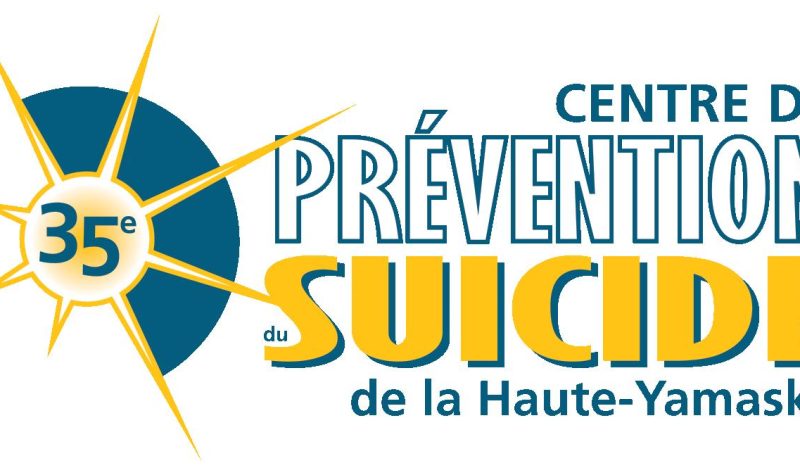The 33rd annual Suicide Prevention Week is being recognized this week. This year’s campaign runs under the theme “Prevention is Better Than Death” to highlight the importance of prevention and to encourage people to talk about about suicide despite any fears or discomfort.
There are two community organizations in the Eastern Townships that provide suicide prevention services: Sherbrooke based organization the JEVI Suicide Prevention Center and Granby based organization the Centre de prévention du suicide de la Haute-Yamaska.
The Centre de prévention du suicide de la Haute-Yamaska provides critical services to those suffering suicidal thoughts or that have attempted suicide and to those in their inner circle. The organization also offers awareness and training activities.
Anne Jutras, executive director of the Centre de prévention du suicide de la Haute-Yamaska, highlights the importance of Suicide Prevention Week and the services that are offered to the Brome-Missisquoi community by the organization.
“The importance is to talk about suicide. It’s really a public health issue. There’s three people in Quebec every day that die by suicide; we need to do something about it. The most pressing thing, and the most effective thing, is to talk about it with the people around us,” emphasized Jutras
Jutras added that the theme "is a bit drastic this year, but it’s true."
“It’s better to talk about it than to end up with someone who might think about death,” she said.
Jutras noted that “distress and suffering doesn’t target specific people.”
“Everyone, at any point in their life, might have had a moment of distress, of suffering, a point where they don’t see the end of the tunnel and they don’t know what to do. Mental health affects everyone and we know now through studies and information that, since the pandemic, our communities are more vulnerable,” mentioned Jutras.“Our mental health took a big kick with this whole pandemic and we know there are more people out there that are suffering.”
Jutras explained that extra stressors like inflation, finding affordable housing, and the price of food add to an already distressful situation.
“It’s that added little stress that leads people to have problems with mental health. It’s important to know that it’s not just one thing, one factor, it’s a whole bunch of things together that bring people to that level of suffering where they actually think about taking their own life,” she said.
When asked why people struggle to reach out for help when they need it most, Jutras highlighted that there is still a lot of “taboo” around talking about mental health and suicide.
“We’re afraid because it touches a subject that is very intense. We don’t know how to talk to somebody not feeling well. If we ask someone ‘well how are you doing?’ and they say ‘not so well,’ we think that we’re going to have to solve their problem, but that’s not the case,” explained Jutras. “There’s a lot of stigma around asking for help still nowadays, especially the older generation where you were self-sufficient and had to deal with your own stuff.”
Then, there's the concern as to whether or not someone is actually going to be able to help them, continued Jutras.
“That’s a big misconception. If you don’t feel safe talking to someone in your close environment, there are services out there that will listen to you. They are there for that sole purpose; they will not judge you and they will listen,” she said. “You can ask for help, it’s not a bad thing, it’s actually a position of strength. You’re strong if you’re able to go out there and ask for help.”
The Centre de prévention du suicide de la Haute-Yamaska is one place that Brome-Missisquoi citizens can turn to in times of distress.
“We do phone interventions, people can call us and receive services 24/7. We do in-person services, so someone can come to the centre and chat with one of the workers here. We have partnerships with hospitals, health clinics, and things like that so we actually do follow-ups with some clients on a regular basis that have suicidal thoughts or that have attempted suicide,” highlighted Jutras.
The centre also works with the families, friends, and co-workers.
“People in the environment of that person that has suicidal thoughts or that has attempted suicide. It goes further than just the person. We offer training for professionals, health professionals and professionals in the schools, to be able to identify and support those people, those youth, that might have suicidal thoughts. We also work with people bereaved by suicide,” added Jutras.
At the end of the day, Jutras emphasized that it all comes back to “let’s talk about.”
“Let’s be supportive and caring of each other in our communities. Lending an ear doesn’t mean that you have to be a professional and that you have to fix everything. (…) Just having an open ear, no judgement, not trying to fix the problem, is often a huge relief for that person, and sometimes it will be their first step to hmmm maybe I do need help.”
Suicide Prevention Week will run from Feb. 5-11.
For more information on the Centre de prévention du suicide de la Haute-Yamaska.
For 24/7 support, call 450-375-4252 or go to the chatline at suicide.ca.
Listen to the full interview below:


